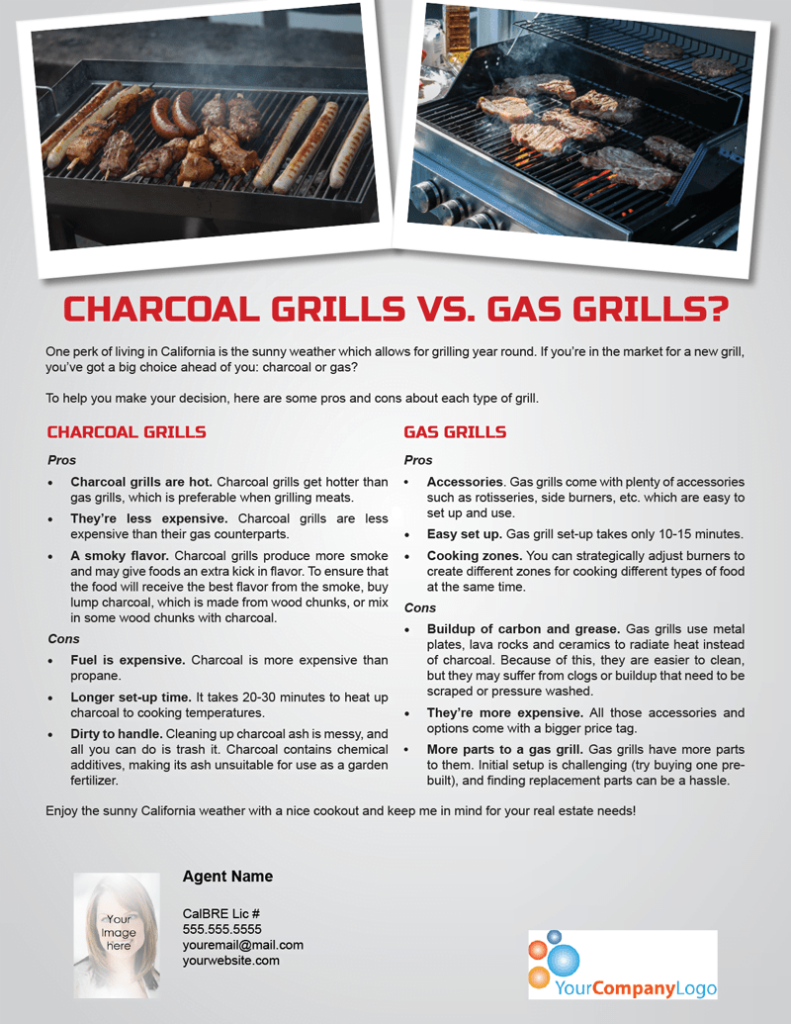If you’re a grill enthusiast, then you know the sizzling joy of cooking up a delicious barbeque feast. But when it comes to choosing between charcoal and gas grills, the decision can spark some fiery debates. In this article, we’ll explore the benefits of using charcoal grills versus their gas counterparts. Whether you’re after smoky flavor or quick convenience, we’ll help you discover which grill is the perfect match for your outdoor cooking adventures. So grab your apron and get ready to fire up the grill!
Flavor
Enhanced flavor with charcoal grills
When it comes to flavor, charcoal grills are known for producing that unmistakable smoky taste that many people love. Charcoal provides an enhanced flavor to your grilled food that just can’t be replicated with gas grills. The high heat produced by charcoal creates a perfect sear on steaks, burgers, and other meats, resulting in a delicious caramelized crust that locks in the juices, while infusing a charred and smoky flavor. The smoky aroma from the charcoal also adds an extra dimension of taste to your grilled dishes, creating a mouthwatering experience that simply can’t be beat.
Different flavors with different types of charcoal
One of the fascinating aspects of charcoal grilling is the ability to experiment with different types of charcoal, each bringing its own unique flavor to your food. From traditional briquettes to hardwood lump charcoal, there are various options available in the market. If you prefer a milder smoky flavor, briquettes can be a great choice. On the other hand, using hardwood lump charcoal can introduce more distinct flavors such as mesquite, hickory, or applewood, depending on the type of wood used. This variety allows you to customize your grilling experience and explore different tastes to match your personal preferences and culinary creations.
Less flavor control with gas grills
While gas grills offer convenience and ease of use, they generally lack the ability to replicate the distinct flavor of charcoal grilling. Gas grills burn clean and do not produce the same smoky flavor that charcoal grills are renowned for. Although some gas grills have options for adding wood chips or smoker boxes to enhance the flavor, the results may still fall short of what charcoal can achieve. If you’re someone who values the authentic and rich smoky taste in your grilled foods, a charcoal grill is the way to go.
Temperature Control
Precise temperature control with gas grills
One of the advantages of using a gas grill is the precise temperature control it offers. Gas grills allow you to dial in your desired temperature and maintain it consistently throughout your cooking process. This makes it easier to achieve specific results, especially when it comes to delicate foods like fish or veggies that require precise cooking times and temperatures. With the turn of a knob, you can quickly adjust the heat to adapt to different recipes, ensuring perfectly cooked meals every time.
Adjustable heat zones with gas grills
Another temperature control feature that gas grills excel at is the ability to create adjustable heat zones. This feature allows you to have different areas of your grill set at different temperatures simultaneously. For example, you can have one side of the grill set to high heat for searing steaks, while the other side is set to lower heat for cooking vegetables or keeping food warm. This versatility comes in handy when you’re juggling multiple dishes or trying to satisfy different cooking preferences at the same time.
Limited temperature control with charcoal grills
On the other hand, charcoal grills offer less precise temperature control compared to their gas counterparts. The heat output of charcoal is influenced by factors such as the amount of charcoal used, its placement, and the airflow within the grill. While experienced grillers can gauge the temperature by observing the color of the coals or using handheld thermometers, it takes practice and experimentation to master the art of controlling the heat on a charcoal grill. This can be seen as a challenge for some, but others appreciate the hands-on approach and the art of grilling that comes with it.
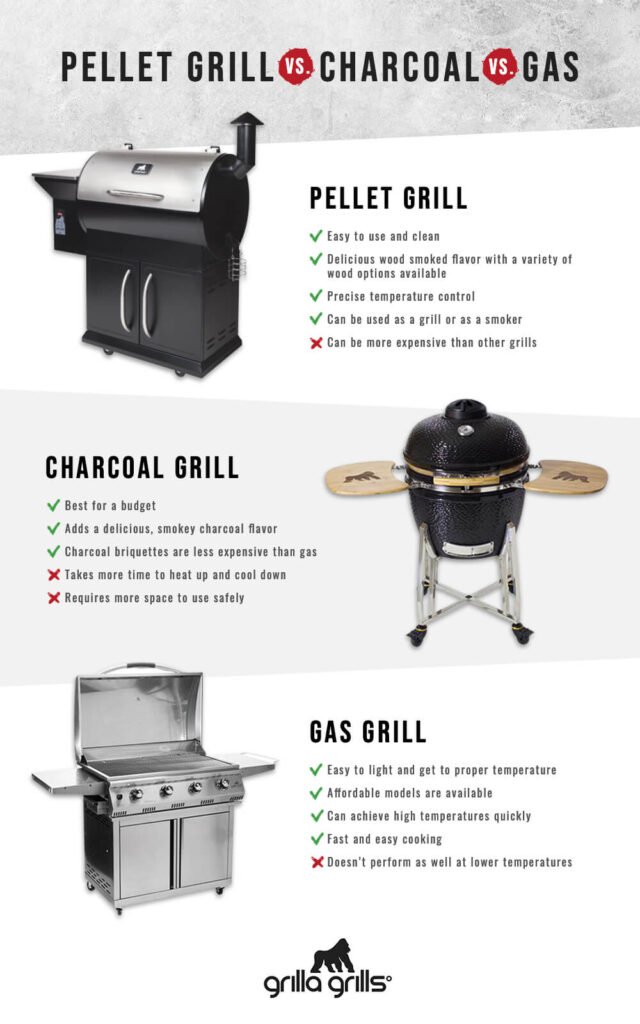
Versatility
Charcoal grills offer more versatility in cooking methods
When it comes to versatility, charcoal grills take the crown. They provide a wide range of cooking methods and techniques that can be employed to create diverse and exciting dishes. With a charcoal grill, you have the freedom to sear steaks, smoke ribs, slow-cook a pork shoulder, or even bake homemade pizzas. The ability to use different cooking methods gives your culinary skills a chance to shine, allowing you to expand your grilling repertoire and impress your family and friends with a variety of delicious meals.
Gas grills are more limited in cooking techniques
While gas grills offer convenience and ease of use, they are more limited in terms of cooking techniques compared to charcoal grills. The direct heat provided by gas grills makes them great for quickly grilling burgers, hot dogs, and vegetables. However, when it comes to techniques like smoking or achieving a perfect sear, gas grills may fall short. The low and slow cooking required for smoking meats is better suited for charcoal grills, which allow for better control over temperature and smoke production.
Charcoal grills allow for smoking and searing
Charcoal grills are particularly well-known for their ability to smoke meats to perfection. The combination of charcoal, wood chips, and a well-ventilated grill creates the ideal environment for low and slow smoking, infusing your meats with a deep and flavorful smokiness. Additionally, charcoal grills excel at creating the intense heat needed for achieving a mouthwatering sear on steaks or chops. The high heat generated by the coals produces a beautiful crust that seals in the juices, resulting in a juicy and tender cut of meat.
Portability
Gas grills are more portable
When it comes to portability, gas grills have the upper hand. Gas grills are typically designed with portability in mind, featuring lightweight materials, compact sizes, and often foldable legs or handles for easy transportation. This makes them ideal for tailgating, camping trips, or picnics in the park. Gas grills also have the advantage of quick and easy setup, allowing you to start grilling in no time. Their portability and convenience make them a popular choice for those who enjoy grilling on the go.
Charcoal grills require more setup and cleanup
On the other hand, charcoal grills require more setup and cleanup, making them slightly less portable compared to gas grills. Setting up a charcoal grill involves arranging the charcoal, lighting it, and waiting for it to reach the desired temperature before you can start grilling. Additionally, after grilling, the ash and charcoal remnants need to be properly disposed of and the grill cleaned. While this process may take a little extra time and effort, many grill enthusiasts argue that the authentic taste and cooking experience gained from charcoal grills more than make up for it.
Convenience of gas grills for outdoor activities
For outdoor activities where ease and convenience are paramount, gas grills can’t be beaten. The ability to quickly start grilling at the push of a button and the ease of cleaning with removable grease trays make gas grills a hassle-free option for spontaneous barbecue gatherings or family outings. Gas grills offer the perfect solution for those looking to enjoy the great outdoors without the need for extensive setup or cleanup, allowing you to focus on the most important aspect – enjoying good food and good company.
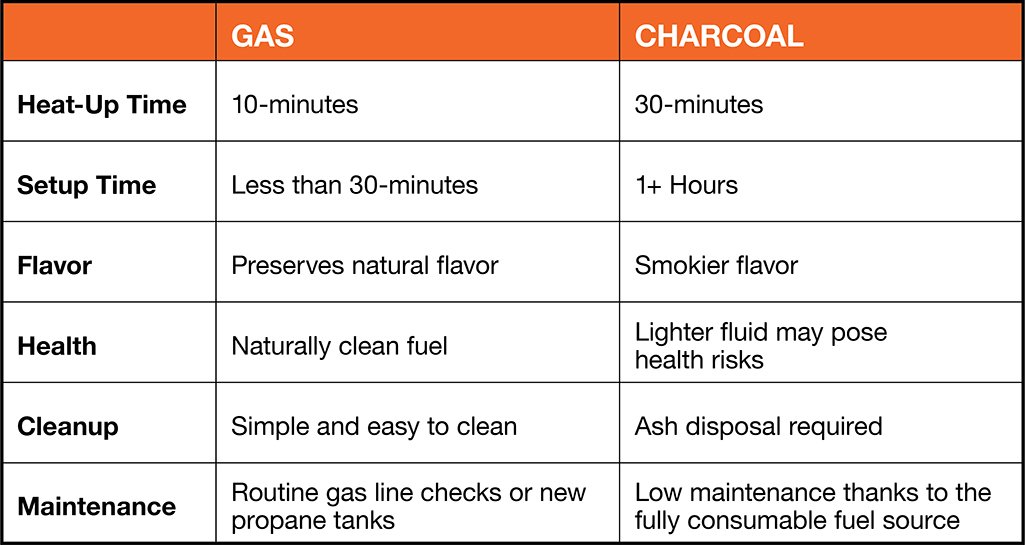
Cost
Charcoal grills are generally less expensive
If cost is a deciding factor for you, charcoal grills tend to be more budget-friendly compared to gas grills. Charcoal grills come in a wide range of prices, making them accessible to those with varying budgets. Basic charcoal grills are often more affordable than their gas counterparts, allowing you to enjoy the benefits of grilling without breaking the bank. Additionally, the ongoing fuel costs associated with charcoal grilling tend to be lower compared to the cost of propane or natural gas for gas grills. This affordability makes charcoal grills a popular choice for many grill enthusiasts.
Gas grills require ongoing fuel costs
When considering the cost of a gas grill, it’s important to factor in the ongoing expenses of fuel. Whether using propane or natural gas, running a gas grill requires a steady supply of fuel, which comes at an additional cost. While gas grills tend to be more fuel-efficient compared to charcoal grills, the regular purchase or refill of gas tanks can add up over time. However, the convenience and ease of use provided by gas grills are often worth the investment for those who prioritize quick and hassle-free grilling.
Comparison of initial investment and long-term expenses
When choosing between charcoal and gas grills, it’s essential to consider not only the initial investment but also the long-term expenses. While charcoal grills may have a lower upfront cost, the ongoing purchase of charcoal bags can accumulate over time. On the other hand, gas grills require a higher initial investment but may prove more cost-effective in the long run, especially if you plan on grilling frequently or for larger gatherings. Assessing your grilling needs, budget, and frequency of use will help you make an informed decision about which grill option is the most cost-effective for you.
Ease of Use
Ease of ignition with gas grills
When it comes to ease of use, gas grills are the clear winner. With just a simple push of a button or turn of a knob, you can quickly ignite the burners and have your grill ready for cooking in minutes. This convenience is particularly beneficial for those who lead busy lives or want to enjoy a spontaneous grilling session without the hassle of setting up charcoal and waiting for it to reach the desired temperature. Gas grills allow you to focus on the culinary aspect of grilling rather than spending time on the initial setup.
Charcoal grills require more time and effort for setup
In contrast, charcoal grills require more time and effort to get started. The process begins with arranging the charcoal briquettes or lump charcoal in the grill, followed by the ignition using chimney starters or lighter fluid. The charcoal then needs time to heat up and reach the optimal cooking temperature, which can take anywhere from 15 to 30 minutes, depending on the grill and the amount of charcoal used. While some people may enjoy the ritual of setting up a charcoal grill, others may prefer the convenience and speed offered by gas grills.
Convenience of gas grills for quick and easy grilling
For those who prioritize convenience and quick grilling sessions, gas grills are the go-to option. With minimal setup time and straightforward ignition, you can have your gas grill up and running in no time. This convenience is particularly handy for weeknight dinners when time is limited or when unexpected guests show up. The ability to effortlessly ignite the burners and start grilling right away allows for more spontaneous and stress-free culinary endeavors, ensuring you can enjoy your favorite grilled foods without any unnecessary delays.
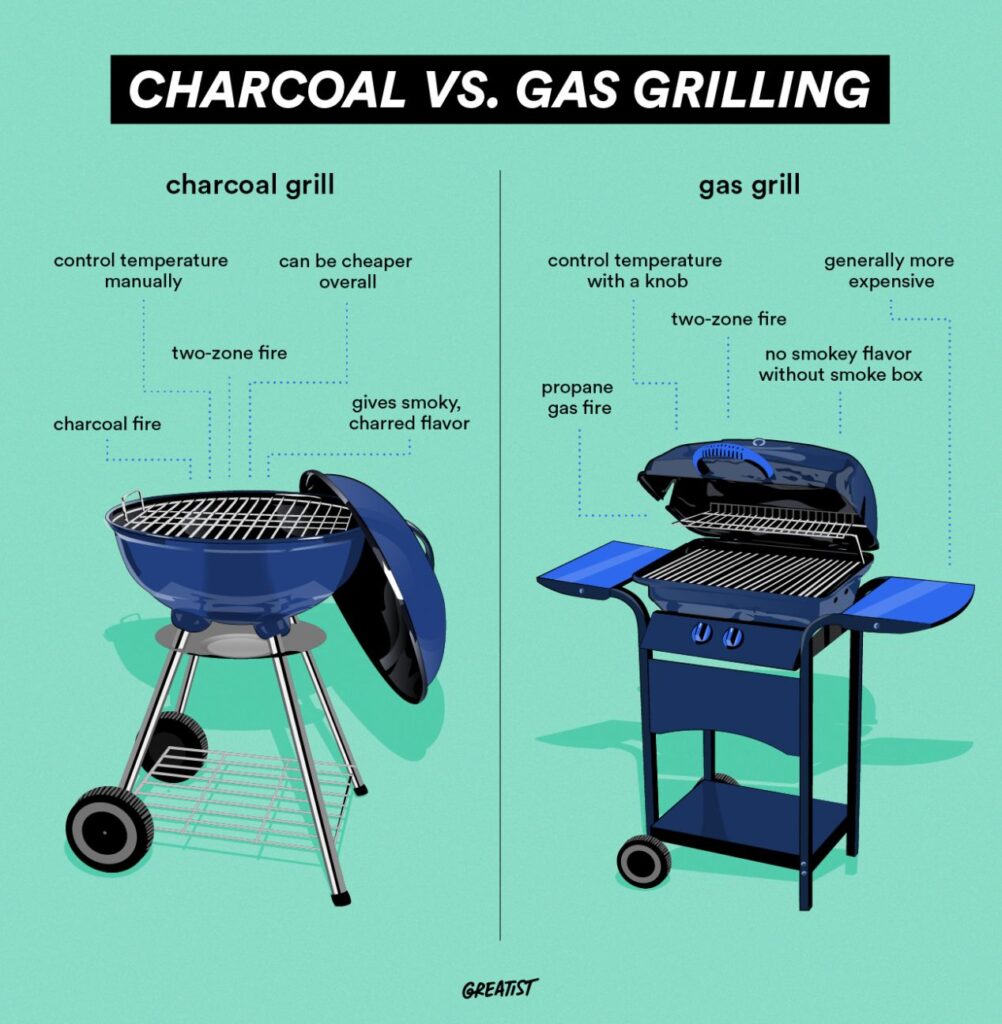
Environmental Impact
Charcoal grills produce more emissions
When it comes to environmental impact, charcoal grills tend to produce more emissions compared to gas grills. The burning of charcoal releases various pollutants, including volatile organic compounds (VOCs), carbon monoxide, and soot, which contribute to air pollution. Additionally, the production of charcoal involves cutting down trees, which can have negative effects on deforestation and wildlife habitats. Although some manufacturers produce more sustainable and environmentally friendly charcoal options, overall, the carbon footprint associated with charcoal grilling is generally higher compared to gas grilling.
Gas grills are generally more environmentally friendly
Gas grills, on the other hand, are considered to be more environmentally friendly. While they do produce carbon dioxide emissions when burning propane or natural gas, the levels of VOCs and soot are significantly lower compared to charcoal grills. Additionally, the extraction and transportation of natural gas can be more efficient and have a smaller environmental impact compared to the production of charcoal. Choosing a gas grill can be a more sustainable option for those conscious of their environmental footprint and looking to reduce their contribution to air pollution.
Comparison of carbon footprint and sustainability
When evaluating the environmental impact of your grilling choices, it’s important to consider the overall carbon footprint and sustainability of your chosen grill. While both charcoal and gas grills produce some emissions, gas grills generally have a lower impact. However, it’s worth noting that certain factors, such as the source of the charcoal and the energy efficiency of gas grills, can also impact their environmental friendliness. Opting for more sustainable and responsibly sourced charcoal or considering the use of renewable energy sources for gas grills can further reduce the environmental impact of your grilling activities.
Authenticity
Charcoal grills provide a more traditional grilling experience
For many grill enthusiasts, the allure of charcoal grills lies in the authentic and traditional grilling experience they offer. Charcoal grilling has been around for centuries and is deeply rooted in cultural traditions around the world. The process of lighting the charcoal, tending to the flames, and getting that perfect sear on your food adds an element of romance and nostalgia to the grilling process. For those seeking a true and traditional grilling experience, charcoal grills provide a connection to the past and the opportunity to engage in a time-honored culinary tradition.
Gas grills may lack the authentic smoky flavor
While gas grills offer convenience and ease of use, some argue that they may lack the authentic smoky flavor that comes with charcoal grilling. The flavor and aroma produced by the interaction of charcoal and wood smoke are what many consider to be the epitome of a grilled meal. While gas grills can still produce deliciously grilled food, some grill enthusiasts believe that the absence of the smoky essence takes away from the overall experience. It ultimately comes down to personal preference and the value one places in the distinctive flavor and ambiance that charcoal grilling brings to the table.
Preference for traditional grilling methods
The choice between using charcoal or gas grills often comes down to personal preference and the significance one places on the traditional grilling experience. For those who enjoy the tactile nature of sparking up charcoal and relish the opportunity to tend to the fire, charcoal grills offer a hands-on and intimate connection with the cooking process. The nostalgic charm, the smoky aroma, and the sense of accomplishment that comes with mastering the art of charcoal grilling can be deeply satisfying for those who appreciate the traditions and rituals associated with it.
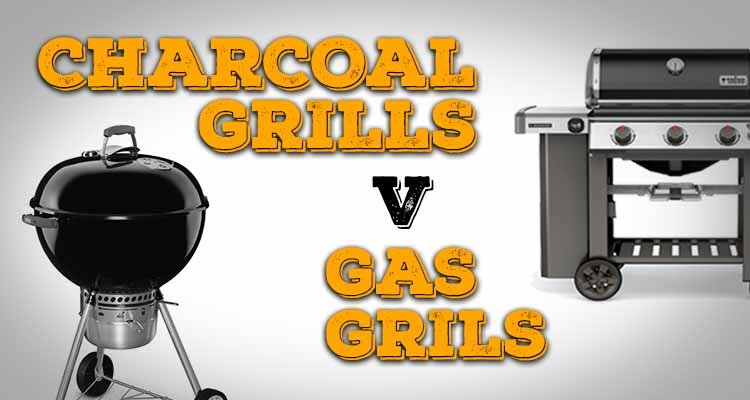
Maintenance
Cleaning and maintenance of gas grills
In terms of maintenance, gas grills generally require less effort and time compared to charcoal grills. Gas grills often come equipped with components that make cleaning a breeze, such as removable grease trays and non-stick grates. After each use, simply remove the trays, clean them, and wipe down the grates to keep your gas grill in good condition. Additionally, gas grills may require periodic checks and maintenance of the gas lines, burners, and ignition system to ensure they are functioning properly and safely. Regular cleaning and maintenance can prolong the lifespan of your gas grill and keep it in optimal working condition.
Charcoal grills require more cleaning and maintenance
In contrast, charcoal grills typically require more cleaning and maintenance. The remnants of charcoal, ash, and grease can accumulate in the grill after each use, necessitating regular cleaning to prevent buildup and potential fire hazards. The grates may need to be scrubbed or seasoned to remove any residue and keep them in good shape. Additionally, the vents and airflow controls of charcoal grills should be inspected and kept clear to ensure proper ventilation and temperature control. While this may require a bit more effort, many avid grillers view the cleaning and maintenance aspects as part of the overall grilling experience.
Comparison of ease and frequency of maintenance
When comparing the ease and frequency of maintenance between charcoal and gas grills, gas grills have the advantage of being generally easier and quicker to clean and maintain. The design of gas grills, with their removable trays and non-stick grates, simplifies the cleaning process. Charcoal grills, on the other hand, require more attention to detail, as the ash and charcoal remnants need to be properly disposed of and the grill surfaces thoroughly cleaned. The frequency of maintenance also varies, with gas grills typically needing more periodic checks and maintenance of the gas system, while charcoal grills may require more frequent cleaning.
Health Considerations
Potential health risks associated with charcoal grilling
While charcoal grilling brings with it a delicious smoky flavor, there are potential health risks that come along, primarily due to the formation of harmful compounds during the grilling process. When fat and juices drip onto the hot coals, they create smoke that can contain polycyclic aromatic hydrocarbons (PAHs) and heterocyclic amines (HCAs). These compounds have been linked to an increased risk of cancer. To minimize exposure to these harmful substances, it is advised to avoid excessive charring or burning of meat, trim excess fat before grilling, and use marinades or rubs containing herbs and spices, which have been found to reduce the formation of these compounds.
Gas grills are generally considered safer
Gas grills are generally considered safer in terms of potential health risks. Unlike charcoal grilling, there is no direct contact between the food and the flames, reducing the chances of harmful compounds being formed. Additionally, with precise temperature control, it’s easier to ensure that meats are thoroughly cooked, minimizing the risk of foodborne illnesses. However, it’s important to always follow safe grilling practices regardless of the type of grill used, such as practicing proper food handling, cooking meats to safe internal temperatures, and maintaining cleanliness and hygiene throughout the grilling process.
Comparison of health aspects and precautions
When it comes to health considerations, it’s important to keep in mind that both charcoal and gas grilling have their own set of precautions and guidelines. While charcoal grilling is associated with potential risks due to the formation of harmful compounds, these risks can be mitigated by adopting safe grilling practices. Gas grills provide a safer option, but precautions must still be taken to avoid undercooking or cross-contamination of food. By following recommended guidelines, such as proper food handling, using a food thermometer, and cooking to safe temperatures, you can enjoy the benefits of grilling while minimizing potential health hazards.
In conclusion, the choice between using charcoal or gas grills ultimately comes down to personal preferences, needs, and priorities. Charcoal grills offer enhanced flavor, versatility in cooking methods, and a traditional grilling experience, but may require more setup, maintenance, and cleanup. On the other hand, gas grills provide convenience, precise temperature control, and ease of use, but may lack the authentic smoky flavor and may come with ongoing fuel costs. Considering factors such as flavor preferences, cooking techniques, portability, cost, environmental impact, and health considerations can help you determine which type of grill is the best fit for your grilling adventures. Whether you’re a die-hard charcoal enthusiast or a gas grill devotee, both options offer their own unique benefits and can provide countless hours of grilling enjoyment. So fire up the grill, gather your favorite ingredients, and get ready to embark on a flavorful culinary journey – your taste buds will thank you!
